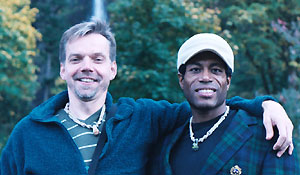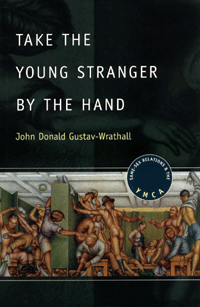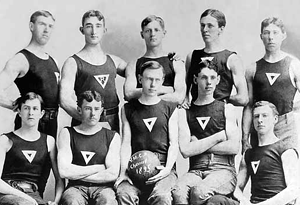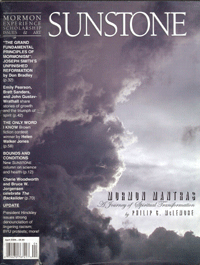The YMCA, Same-Sex Relationships, and the Gospel: An Interview with John Donald Gustav-Wrathall

By Hugo Salinas
April 2007
At the Portland conference I had the pleasure of meeting John Donald Gustav-Wrathall, a gay Mormon man from Minneapolis who almost ten years ago wrote Take the Young Stranger by the Hand: Same-Sex Relations and the YMCA (Chicago & London: The University of Chicago Press, 1998). Recently John has decided to start an Affirmation group in the Minneapolis/St. Paul area and, despite the fact that he has been partnered for 14 years, he has also decided to return to the LDS Church—an experience that he has described in a recent article, “A Gay Mormon’s Testimony” (Sunstone, April 2006, 52-57). The last day of the conference, as we rode by bus to the beautiful Columbia River Gorge, I conducted this interview with John.
You describe in your book profound emotional bonds that some men created in the 19th and early 20th century in the YMCA, but you’re a lot more tentative about attributing a sexual dimension to those relationships. Why is that?
First of all, because I didn’t find any evidence of a sexual dimension. That wouldn’t necessarily mean that one wasn’t there, but I think based on what I knew about these men and about their religious and spiritual commitments, even if there was some element of sexual attraction that these men experienced (and I am reasonably willing to bet that there was), they probably sublimated that in some way and it came out in these very intense relationships that they had with each other, which I believe were emotional, but probably didn’t have a physical dimension.
I think also interpolating based on my own experience being raised LDS in a very conservative environment—I saw a lot of parallels between the kind of spiritual culture that they had and the kind that I grew up with.
How is it that the kind of sex education that the YMCA promoted in the early 20th century ended up undermining the tradition of the YMCA bachelor?
Once the YMCA started to focus more attention on homosexuality and started to do education about homosexuality as a pathology, they started to be concerned about all these YMCA leaders who had been bachelors for life and whose main motivation in life was to be with other men.
I saw the same dynamic in my own life growing up: When you’re in a culture where people are not aware of homosexuality, they don’t pick up on the clues that gay people exist. I think what we’re seeing now in our society is that the more aware people become of homosexuality, they more easily they spot the tell-tale signs, and this is what happened in the YMCA.

Part of the process of writing this book was my own process of integrating my spirituality and my sexuality and seeing my bonds with men as being multidimensional—as being emotional, and spiritual, and physical.
At the end of the introduction to your book, you say that “many YMCA men may have used cruising in an attempt to make sense of longings they could no longer express in the organization in a socially acceptable manner.” Aren’t you flirting here with Dr. Joseph Nicolosi’s crock theory that men turn to gay sex because they fail to create appropriate emotional bonds with other men?
I wasn’t aware of Joseph Nicolosi’s theory at the time I wrote this book. What I’m saying is that these men couldn’t find a permanent loving commitment with each other, a commitment which could have had a sexual dimension, because they were in a situation that didn’t allow them to be more open about that. When there is no positive outlet for the physical aspect of your relationship, it’s easier to cut yourself off completely from a relationship that has any emotional or spiritual components in it and split the physical sex off into a separate part of your life.
Part of the process of writing this book was my own process of integrating my spirituality and my sexuality and seeing my bonds with men as being multidimensional—as being emotional, and spiritual, and physical. And what I saw here in the cruising scene at the YMCA is an example of that unity of attraction being fragmented: instead of being able to acknowledge a physical relation in an already existing emotional and spiritual relation, they had to find these physical outlets which I think are very unhealthy.
One of the big sex scandals in the YMCA was right here in Portland, Oregon. As I read about it, I saw examples of lives that were completely shattered: respectable people, members and leaders of the YMCA were implicated in this very devastating scandal. I looked at that situation and thought: How tragic that they were not allowed to express their love for each other in a more direct and holistic way. I still see that as very typical of our broader society’s response to homosexuality, and conservative churches’ response to homosexuality, that forces us to fragment rather than to integrate.
I see similarities between the Victorian ethos that dominated Samuel M. Sayford’s anti-masturbation lectures and the anti-masturbation speech given once by Elder Boyd K. Packer in that both lectures were given in a gender-segregated, discrete, almost confidential setting. There are also similarities in the use of euphemistic expressions, such as “purity,” “self-abuse,” and others. Have you ever thought about those similarities?
My interest in this as a topic for research certainly had to do with the kind of environment that I was raised in. Certainly growing up Mormon, much more so than in the general culture, we had kind of a Victorian upbringing when it came to sex. There was the same kind of reticence about talking openly about it. You just didn’t say words like “masturbation” except in these really emotionally charged settings. When I was in fourth grade, neighborhood vandals spray-painted the word “fuck” on the driveway of my best friend. When I asked my parents what this meant, my Dad sat me down and gave me the sex talk. He was so uncomfortable talking about it with me! I remember him explaining sex to me between a man and a woman, and I came away from this thinking, “I have no idea what he was talking about.” I was confused, and it wasn’t till I went to BYU at the age of 18 years old that I finally started to get a clear idea of what sex was all about. That sounds bizarre, but that was the kind of the environment I grew up in. So I do see a lot of similarities between 19th-century cultural attitudes toward sexuality and the culture that I grew up in.

I think part of the reason I was attracted to the YMCA as an organization is because I saw this intensity expressed through deep evangelical commitment in these young men, and the way that they bonded to each other in a very intense way was reminiscent to me of my own missionary experience.
In your bibliography you mention D. Michael Quinn’s book on same-sex dynamics. Do you think there are similarities between the homosocial, gender-segregated experiences men had at the YMCA in the 19th century and what Mormon men—and women—experience in the MTC and as mission companions?
As Mike Quinn writes in his book, the Mormon gender-segregated culture and this culture of same-sex bonding was not unique to Mormonism in the 19th century. This was part of the American culture generally. So what he found in his study of Mormonism in the 19th century, I was finding in mainstream white Protestant culture. Other historians have amply documented this same-sex culture of the 19th century. So yes—there should be parallels between Mike’s research and my own research.
I think part of the reason I was attracted to the YMCA as an organization is because I saw this intensity expressed through deep evangelical commitment in these young men, and the way that they bonded to each other in a very intense way was reminiscent to me of my own missionary experience. I was a devout Latter-day Saint; I took my mission very seriously, had a strong testimony of the gospel; and I saw the same kind of fervor in these young men. I was drawn to this particular subject because of my own experience.
In Take the Young Stranger by the Hand, you say that you sustained intense relationships with same-sex friends in religious contexts: hugging, touching, on occasions even sleeping in the same bed and caressing and hugging each other, though not getting involved in overt sexual acts. Don’t you think such a repressed approach to relationships is intrinsically unhealthy and can lead young people to anxiety, depression, and even suicide?
That’s an interesting question—this is the first time anybody’s asked me that. Before coming out, I had a very intense friendship with another man. I don’t know if he was gay, but I suspect he was. We had this relationship where we were very emotionally open with each other and we shared a lot. We did sleep in the same bed together. We hugged and we kissed, but we were never overtly sexual. I remember having a conversation with him in which I said, “Wouldn’t it be great if we could spend the rest of our lives together? Maybe after you marry and I marry, we can be next-door neighbors and we can always be together.”
That friendship made me so happy. I honestly think that in my mind at that time I didn’t need to have a sexual component in that relationship with him. What was really most important to me was the emotional bond and the connection to another human being. Now I have come to embrace my sexuality as a good thing; I have been in a committed relationship for over 14 years, and we have the physical element of our relationship which has really deepened the relationship. But I think I would have been happy having this intense friendship with this person. Looking back on it, I don’t think of it as being an unhealthy situation; but I don’t think it is unhealthy for the sexual element to be added to that kind of relationship, either.
How did you meet your partner of 14 years, Göran?
Believe it or not, we met at a gay bar. We had seen each other at the same bar for weeks, maybe for months, and every time I saw him I thought, I’d love to get to know him a little bit better, but I was too shy to go up and talk to him. He apparently had been watching me and thinking the same thing, and one night I was there, and he asked me to dance, so that’s how we met.

For me, what makes an eternal marriage eternal is learning to love the way God loves. That’s how I understand my relationship with my partner. I see it as a very important part of my own spiritual development and part of what I was sent down here to learn.
In a recent Sunstone article you wrote that you believe that being a faithful gay Latter-day Saint includes honoring and being faithful to your same-sex partner. What does it mean to you to call Göran your husband?
I believe that the aspect of ourselves that is most like our Heavenly Father is our capacity to love. That love is expressed in many different ways. It’s expressed in compassion towards those who are less fortunate, it’s expressed in charity, it’s expressed in our ability to forgive people who wrong us. Every expression of love that exists is an aspect of this, and this includes in my mind the intimate relationships that we create with one another. And in every intimate relationship, whether it’s gay or straight, in order for that relationship to grow and develop, each partner has to learn elements of patience, self-sacrifice, consideration, and giving—faithfulness and fidelity as well!
With the guidance of the Spirit, I have come to believe that this principle of sexual faithfulness embodies an important characteristic of the kind of love that we need to learn. There are lessons about love that we can’t learn without these kinds of relationships. Now, not everybody will have a chance to have these kinds of relationships in this life. If you don’t have an opportunity, those are lessons you don’t need to learn in this life. But I believe that if we have the blessing of being in this kind of a relationship, learning about this kind of love is something that we are called to do. For me, what makes an eternal marriage eternal is learning to love the way God loves. That’s how I understand my relationship with my partner. I see it as a very important part of my own spiritual development and part of what I was sent down here to learn.
The LDS Church recently threatened with disciplinary actions a gay Mormon man who married his partner in Canada. Doesn’t this suggest that the Church is taking steps backward instead of forward in this issue? With gay-friendly churches now established all over the US, why would you want to reconcile yourself with such a backwards institution?
Everybody asks me that question! Not long ago, I made the decision to re-affiliate with the LDS Church. From a lot of people’s point of view, the only way that I can return to the Church is if I give up my relationship with my partner and commit to a life of celibacy and am formally re-baptized, but for me the journey has been acknowledging my testimony of the gospel and affirming the principles of the gospel in my life again. My decision to return was a spiritually guided decision—it was nothing that I ever expected to happen. I came to the Sunstone Symposium of 2005, I had been invited by Mike Quinn to come, and I had such a powerful spiritual experience—the Holy Spirit literally yanked me and told me, “It’s time to come home, John.” So it was really the Spirit pushing me to come back. I was angry and didn’t know what to do about this. I went home and didn’t tell anybody about this spiritual experience that I had had, but it wasn’t something that I could ignore.
Over the following months, I went through a process of asking myself what I was going to do about this. Affirmation came to mind as the first resource to me. I went to the Affirmation website and saw that there was nothing available in Minneapolis, so I contacted Olin Thomas and said, “I would like to be a contact for Affirmation because I really need to associate with other Latter-day Saints.” At that point it was impossible for me to even think about going to an LDS ward, because I felt so threatened by that. But the Spirit kept pushing me, and I started attending meetings in the Lake Nokomis Ward in Minneapolis, and step by step I have felt very guided to begin this process.
It’s come to a point now where I feel that I need to try to live as faithfully as I can as a Latter-day Saint within the constraints I have to live with. Because I’m committed to my partner, that means I can’t be re-baptized—that’s what my bishop has made very clear to me. But my bishop has also made it very clear to me that I am welcomed, that he wants me to attend; he wants to encourage me to live as faithfully as I can—to live the Word of Wisdom, to study the scriptures, to pray daily, to attend meetings, and to learn from Church leaders. As I have done this, I have experienced blessings in my life. That’s the bottom line for me. The truth is that even though the Church has taken a very strong anti-gay position, I find the basic principles and teachings of the Church very empowering and very useful—especially the LDS understanding of the pre-existence and our relationship with God as literally our Father in Heaven, and the understanding of the nature of this life as being a probation for us and a test that will allow us to become like our Father or Mother in Heaven. This understanding has been so empowering to me.
So despite the Church’s teachings about homosexuality and despite how painful it is for me that I can’t be a member in good standing with my current relationship, nevertheless I have never in my life felt more spiritually grounded and more complete and whole as a human being as I do now. And that’s pretty much my testimony.
—
For personal stories from Affirmation community members, visit the Faces of Affirmation page. To get in touch with the Affirmation community, see our list of online groups.